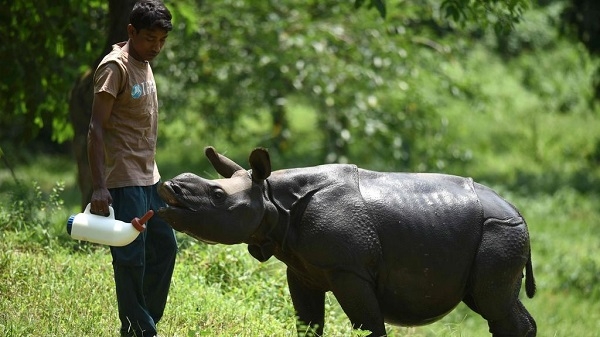GOI launched National Conservation Strategy for One - Horned Rhinos
Total Views |
New Delhi, Sept 22 : On the occasion of World Rhino Day, celebrated on Sept 22 every year, the Environment Ministry has launched a National Conservation Strategy for Indian One - Horned Rhinos. Union Minister Prakash Javadekar said on the occasion that India is home to the largest number of One - Horned Rhinos in the world. The GOI has launched the strategy in order to protect the natural heritage of the nation.

The strategy aims at conserving the One - Horned Rhinos in both India as well as Nepal. Hence, the same protocols will be implemented for the conservation projects of the Rhinos in Valmiki Tiger Reserve of India, Shuklaphanta and Chitwan National Park of Nepal, and Dudhwa National Park which are continued natural corridors but separated due to political borders between India and Nepal. It was also put forth in the strategy that the conservation initiatives until now have enriched the grassland management which will result in reduction of negative impacts of climate change through carbon sequestration.
The World Wildlife Fund, South Africa has started the tradition of celebrating World Rhino Day on Sept 22 every year since 2010. This is the 10th World Rhino Day with the theme as 'Five Rhino Species Forever.'
Globally five species of Rhinos are known namely Javan Rhinos, Sumtran Rhinos, Black Rhinos, White Rhinos and Greater One - Horned Rhinos. Out of the 5 species, 2 are found in Africa and the other three are found in South Asia. Among these species, the Javan, Sumatran and Black Rhinos are categorized as critically endangered species, White Rhinos as near threatened and the Greater One horned Rhinos are categorized as vulnerable.
According to the estimates of the International Union for Conservation of Nature ( IUCN ), the population of one horned rhinos in the world is 3584, out of which India is home to 2938 and Nepal to 646 rhinos. Therefore, India shares a significant responsibility for the conservation of the species.
India is home to the largest number of Greater One-Horned Rhinoceros in the world with its population in the range of 3000 animals in the States of Assam, West Bengal & UP.@moefcc has launched a ‘National Conservation Strategy for Indian One-Horned Rhino’.#WorldRhinoDay pic.twitter.com/BA2VPQtn6b
— Prakash Javadekar (@PrakashJavdekar) September 22, 2020

